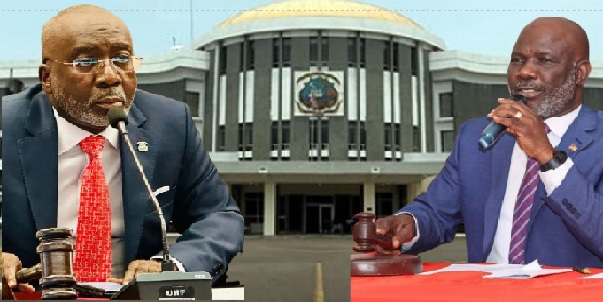Heritage News / 11/Mar/2025 /
ECOWAS Parliament Crushes Liberia's Recall Effort: Majority Bloc Suffer Major Defeat
In a decisive move that has left Liberia's political landscape buzzing, the ECOWAS Parliament has firmly rejected the request from Majority Bloc Speaker Koon to recall and replace three members of the Liberian delegation, reinforcing the integrity of established parliamentary protocols.
In an official letter issued from Abuja on February 25, 2025, the ECOWAS Parliament, through Acting Secretary-General K. Bertin Some, reaffirmed that the mandates of community parliamentarians are fixed for a four-year term.
According to the letter, the three Liberian parliamentarians—Honorable Samuel R. Enders, Sr., Moima Briggs-Mensah, and Taa Z. Wongbe—are not eligible for replacement before the expiration of their term, as they do not meet any of the stipulated exceptions for removal under the rules governing the ECOWAS Parliament.
The letter referenced Article 18.1,2 of the Supplementary Act on the Enhancement of the Powers of the ECOWAS Parliament, which outlines the conditions under which a member can be recalled or replaced.
These include circumstances such as non-re-election at the national level, death, resignation, certified mental or physical incapacity, incompatibility, or dismissal for misconduct. Since none of the Liberian delegates are facing any of these issues, their continued service is assured until their mandates expire.
“The Honorable Members of the ECOWAS Parliament will continue to serve their mandate until its expiration, in line with the international commitments of the Republic of Liberia,” the letter stated.
This ruling has served as a major blow to the Majority Bloc, which has been pushing for changes to Liberia's ECOWAS representation. Their request, seen by many as part of an ongoing power struggle in Liberia’s House of Representatives, was met with staunch opposition from the ECOWAS Parliament, which emphasized its adherence to the legal frameworks governing the body.
For the Majority Bloc, which has seen its control of the House of Representatives come under intense scrutiny following a controversial takeover, this setback represents a significant loss.
Speaker Koon, a key figure in the Majority Bloc, has yet to publicly respond to the ruling. His silence leaves many wondering whether the Majority Bloc will continue to press the issue or shift its focus to other political battles.
Meanwhile, the Minority Bloc, led by Speaker Fonati Koffa, has welcomed the decision, seeing it as a validation of their position and a reinforcement of the ECOWAS Parliament's commitment to procedural integrity.
Speaker Koffa and his allies have been at odds with the Majority Bloc over various issues, and the ruling has given them a boost, especially with a crucial Supreme Court hearing on the horizon.
Koffa's camp views the ECOWAS decision as a sign that Liberia’s internal political conflicts should not interfere with the country’s international obligations.
“This is a win for Liberia's democratic process and international commitments,” said one Minority Bloc lawmaker, who asked to remain anonymous. “It shows that the rules of engagement at ECOWAS are clear, and political power struggles in Liberia should not undermine the integrity of our representation on the regional stage.”
The letter from ECOWAS also underscores the broader context of Liberia’s engagement with the regional body and highlights the growing tensions within the country’s political institutions.
The Majority Bloc's attempt to recall the three delegates is seen by some as an attempt to assert control over Liberia’s international representation, but critics argue that the request undermines Liberia’s commitment to the principles of democracy and regional cooperation.
Within Liberian political circles, reactions to the ECOWAS decision have been mixed. Supporters of the recall have expressed frustration and disappointment, with many questioning the legal framework that restricts the ability of the national legislature to make such decisions.
Some critics argue that the rigid application of ECOWAS rules may limit Liberia’s ability to ensure that its delegates are truly representative of the country’s interests.
In contrast, those who support the ECOWAS decision view it as an important step toward stabilizing Liberia’s international standing.
They argue that by adhering to the ECOWAS regulations, Liberia is signaling its commitment to following the rule of law, which is crucial for maintaining credibility on the regional and international stages.
“The ECOWAS Parliament’s ruling helps reinforce Liberia’s credibility as a stable, law-abiding member of the regional body. At a time when the country faces internal political volatility, this decision helps to ensure that Liberia's representation in ECOWAS remains grounded in legal and institutional frameworks rather than political maneuvering,” said a prominent political analyst.
For now, the three Liberian delegates—Enders, Briggs-Mensah, and Wongbe—will continue their work in the ECOWAS Parliament until the end of their terms, without any interference from the national legislature. Their role in shaping key regional issues such as security, trade, and development will continue, though their positions may come under scrutiny as Liberia’s domestic political battles play out.
In the coming weeks, all eyes will be on the Supreme Court hearing, which will address the bill of information filed by Speaker Koffa and his allies. The outcome of that case may determine the next phase of Liberia's political battles, particularly as the country heads into a presidential election year.
In conclusion, while the ECOWAS Parliament’s rejection of the recall request marks a legal victory for the current Liberian delegates, it has intensified the already complex political dynamics within Liberia.

No Comment Yet!